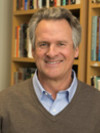John Torpey
John Torpey is Professor of Sociology and History at the Graduate Center, City University of New York, and Director of the Ralph Bunche Institute for International Studies at the Graduate Center. His specializations range from Race, Ethnicity, and Migration to Social and Critical Theory, Sociology of Religion, Sociology of State, Social Class, and Political Sociology. His research interests include Comparative Historical Sociology, Comparative Religion, Conflict, and Changes in the Nature of Warfare in the Contemporary World
He is the author or editor of eight books: Intellectuals, Socialism, and Dissent: The East German Opposition and its Legacy (1995); The Invention of the Passport: Surveillance, Citizenship, and the State (2000); Documenting Individual Identity: The Development of State Practices in the Modern World (edited with Jane Caplan; Princeton: Princeton UP, 2001); Politics and the Past: On Repairing Historical Injustices (2004); Old Europe, New Europe, Core Europe: Transatlantic Relations after the Iraq War (2005), Making Whole What Has Been Smashed: On Reparations Politics (2006); The Post-Secular in Question (2012); and, with Christian Joppke, Legal Integration of Islam: A Transatlantic Comparison (2013). He is on the editorial board of Theory and Society and the Journal of Human Rights, and edits a series for Temple University Press titled “Politics, History, and Social Change.”
Citizenship Lecture on July 18, 6pm | Campus Griebnitzsee, House 7, Room 2.27
The End of the World As We Know It? From Social Citizenship to the Gig Economy
This lecture surveys contributions to social progress in the rich world from the pre-industrial period to the current age of techno-financial capitalism. I explore developments in demography, public health, longevity, and patterns of work with an eye toward understanding the distinctiveness of our contemporary situation. In particular, I argue that contributions to public infrastructure were crucial to advances in public well-being over the past 200 years and that those are now being undermined by a lack of investment that falls particularly hard on the least well-off.

